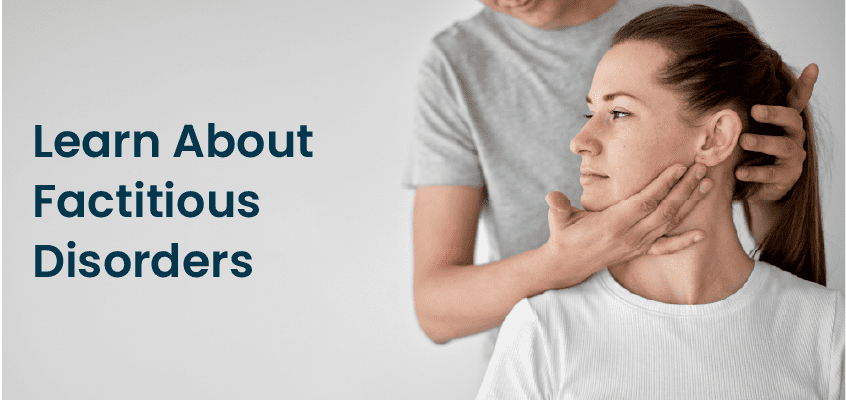A factitious disorder is when a person deliberately fakes symptoms of illness. Factitious disorders are also known as Munchausen syndrome or Munchausen by proxy. They are relatively rare, affecting only about 1% of the population. However, they can be challenging to diagnose because the individuals often deny that they are faking their symptoms.
People with factitious disorders often seek medical help because they are experiencing symptoms that are not real. However, they may also fake or exaggerate these symptoms to get attention from others. If you think you or someone you know might have this disorder, read on to learn more about the symptoms, causes, and treatment of this rare condition.
What are Factitious disorders?
Factitious disorders are mental disorders in which a person creates psychological symptoms to assume the role of a patient and get attention from others. Sympathy or attention-seeking motivates the individual, who may seek to avoid responsibilities or work by feigning illness.
Factitious disorder is also known as Munchausen syndrome, named after Baron von Munchausen, a German nobleman known for his fantastic stories. The term ‘fictitious’ comes from the Latin word ‘fetus’, which means ‘to invent.
While both men and women may have factitious disorders, doctors diagnose this more frequently in women. The disease often develops in young adulthood, frequently after significant stress.
The main types of artificial disorders are imposed on the self and set on another. In the imposed-on-self class, the individual creates symptoms for themselves; in the charge-on style, they develop symptoms for another person, usually a child.
It is often challenging to diagnose factitious disorders as the individuals are usually skilled at deception and may be reluctant to seek help for their condition. Treatment typically involves psychotherapy and support groups.
Types of Factitious Disorder
There are three types of artificial disorders:
1. Factitious disorder by others: This is when a caregiver, usually a parent, produces fake symptoms in another person, such as a child.
2. Factitious disorder imposed on self: This is when a person produces fake symptoms in themselves.
3. Factitious disorder not otherwise specified is when a person produces fake symptoms but does not fit into the other two categories.
Symptoms of factitious disorders
People with factitious disorders may lie about their symptoms, make up elaborate stories about their illness, or even tamper with their bodies to produce evidence of disease. The motivations for this behaviour can vary but often include a need for attention, sympathy, or caregiving. People with factitious disorders may find themselves in a never-ending cycle of doctor visits, hospitalisations, and treatments, all while pretending to be ill.
Common symptoms of factitious disorders include:
- Faking medical tests or X-rays
- Making up stories about previous health problems
- Tampering with medical equipment to produce false readings
- Pretending to faint
- Seeking treatment from multiple doctors and hospitals
- Exaggerating symptoms to family and friends
- Increased knowledge about a particular illness or disease
Causes of factitious disorders
There are no definitive causes of factitious disorders. However, several theories attempt to explain why someone might develop this condition.
One theory suggests that people with factitious disorders have a high need for attention and approval. They may feel they are not receiving enough love and attention, creating an illness to get the attention they crave.
Another theory suggests that people with factitious disorders may have a history of trauma or abuse. They may use the condition to cope with the pain of past experiences.
Whatever the cause, it is clear that people with factitious disorders are not seeking medical help to get well. They are more interested in the attention and sympathy they receive from others when they are sick.
Diagnosing factitious disorders
People with this disorder often go to great lengths to make their symptoms appear convincing and may even make up elaborate stories about their health.
While factitious disorders can occur in adults and children, it is more common in adults, and women are also more likely to have the condition. People with factitious disorders often have a history of seeking medical care frequently, and they may be very familiar with the inner workings of the healthcare system.
Treatment for factitious disorders
Treatment is available and can be effective for factitious disorders. The options include medication and psychotherapy.
Psychotherapy can help patients understand their disorder and learn how to cope with the underlying emotions that drive their need to fake an illness. Cognitive therapy is one type of psychotherapy that helps treat factitious disorders.
Doctors also use medication to treat any underlying mental health disorders contributing to the development of artificial conditions, such as depression or anxiety. The drugs used include antidepressants, antipsychotics, and mood stabilisers.
Finding a mental health professional is essential if you seek treatment for a factitious disorder. Medical professionals provide treatment tailored to the patient’s individual needs.
Conclusion
Factitious disorders are mental disorders where people deliberately fake or exaggerate symptoms for attention or sympathy. The disorder is also known as Munchausen syndrome, named after a German nobleman known for making up stories about his life.
Doctors consider factitious disorders mental illnesses as they can cause serious harm to the individual. People with the condition may go to great lengths to get attention, including lying about their symptoms, faking medical tests, and even harming themselves. While there is no cure currently for factitious disorders, treatment can help people manage their symptoms and live healthier lives.











